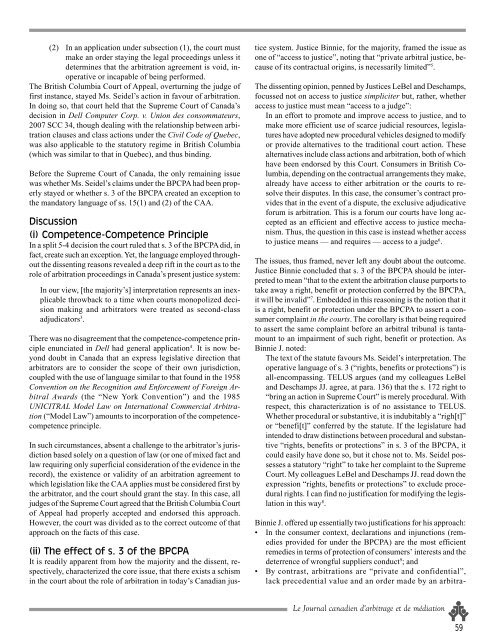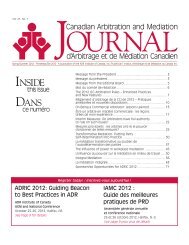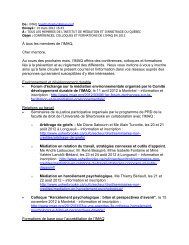Printemps 2011 - ADR Institute of Canada
Printemps 2011 - ADR Institute of Canada
Printemps 2011 - ADR Institute of Canada
Create successful ePaper yourself
Turn your PDF publications into a flip-book with our unique Google optimized e-Paper software.
(2) In an application under subsection (1), the court mustmake an order staying the legal proceedings unless itdetermines that the arbitration agreement is void, inoperativeor incapable <strong>of</strong> being performed.The British Columbia Court <strong>of</strong> Appeal, overturning the judge <strong>of</strong>first instance, stayed Ms. Seidel’s action in favour <strong>of</strong> arbitration.In doing so, that court held that the Supreme Court <strong>of</strong> <strong>Canada</strong>’sdecision in Dell Computer Corp. v. Union des consommateurs,2007 SCC 34, though dealing with the relationship between arbitrationclauses and class actions under the Civil Code <strong>of</strong> Quebec,was also applicable to the statutory regime in British Columbia(which was similar to that in Quebec), and thus binding.Before the Supreme Court <strong>of</strong> <strong>Canada</strong>, the only remaining issuewas whether Ms. Seidel’s claims under the BPCPA had been properlystayed or whether s. 3 <strong>of</strong> the BPCPA created an exception tothe mandatory language <strong>of</strong> ss. 15(1) and (2) <strong>of</strong> the CAA.Discussion(i) Competence-Competence PrincipleIn a split 5-4 decision the court ruled that s. 3 <strong>of</strong> the BPCPA did, infact, create such an exception. Yet, the language employed throughoutthe dissenting reasons revealed a deep rift in the court as to therole <strong>of</strong> arbitration proceedings in <strong>Canada</strong>’s present justice system:In our view, [the majority’s] interpretation represents an inexplicablethrowback to a time when courts monopolized decisionmaking and arbitrators were treated as second-classadjudicators 3 .There was no disagreement that the competence-competence principleenunciated in Dell had general application 4 . It is now beyonddoubt in <strong>Canada</strong> that an express legislative direction thatarbitrators are to consider the scope <strong>of</strong> their own jurisdiction,coupled with the use <strong>of</strong> language similar to that found in the 1958Convention on the Recognition and Enforcement <strong>of</strong> Foreign ArbitralAwards (the “New York Convention”) and the 1985UNICITRAL Model Law on International Commercial Arbitration(“Model Law”) amounts to incorporation <strong>of</strong> the competencecompetenceprinciple.In such circumstances, absent a challenge to the arbitrator’s jurisdictionbased solely on a question <strong>of</strong> law (or one <strong>of</strong> mixed fact andlaw requiring only superficial consideration <strong>of</strong> the evidence in therecord), the existence or validity <strong>of</strong> an arbitration agreement towhich legislation like the CAA applies must be considered first bythe arbitrator, and the court should grant the stay. In this case, alljudges <strong>of</strong> the Supreme Court agreed that the British Columbia Court<strong>of</strong> Appeal had properly accepted and endorsed this approach.However, the court was divided as to the correct outcome <strong>of</strong> thatapproach on the facts <strong>of</strong> this case.(ii) The effect <strong>of</strong> s. 3 <strong>of</strong> the BPCPAIt is readily apparent from how the majority and the dissent, respectively,characterized the core issue, that there exists a schismin the court about the role <strong>of</strong> arbitration in today’s Canadian justicesystem. Justice Binnie, for the majority, framed the issue asone <strong>of</strong> “access to justice”, noting that “private arbitral justice, because<strong>of</strong> its contractual origins, is necessarily limited” 5 .The dissenting opinion, penned by Justices LeBel and Deschamps,focussed not on access to justice simpliciter but, rather, whetheraccess to justice must mean “access to a judge”:In an effort to promote and improve access to justice, and tomake more efficient use <strong>of</strong> scarce judicial resources, legislatureshave adopted new procedural vehicles designed to modifyor provide alternatives to the traditional court action. Thesealternatives include class actions and arbitration, both <strong>of</strong> whichhave been endorsed by this Court. Consumers in British Columbia,depending on the contractual arrangements they make,already have access to either arbitration or the courts to resolvetheir disputes. In this case, the consumer’s contract providesthat in the event <strong>of</strong> a dispute, the exclusive adjudicativeforum is arbitration. This is a forum our courts have long acceptedas an efficient and effective access to justice mechanism.Thus, the question in this case is instead whether accessto justice means — and requires — access to a judge 6 .The issues, thus framed, never left any doubt about the outcome.Justice Binnie concluded that s. 3 <strong>of</strong> the BPCPA should be interpretedto mean “that to the extent the arbitration clause purports totake away a right, benefit or protection conferred by the BPCPA,it will be invalid” 7 . Embedded in this reasoning is the notion that itis a right, benefit or protection under the BPCPA to assert a consumercomplaint in the courts. The corollary is that being requiredto assert the same complaint before an arbitral tribunal is tantamountto an impairment <strong>of</strong> such right, benefit or protection. AsBinnie J. noted:The text <strong>of</strong> the statute favours Ms. Seidel’s interpretation. Theoperative language <strong>of</strong> s. 3 (“rights, benefits or protections”) isall-encompassing. TELUS argues (and my colleagues LeBeland Deschamps JJ. agree, at para. 136) that the s. 172 right to“bring an action in Supreme Court” is merely procedural. Withrespect, this characterization is <strong>of</strong> no assistance to TELUS.Whether procedural or substantive, it is indubitably a “righ[t]”or “benefi[t]” conferred by the statute. If the legislature hadintended to draw distinctions between procedural and substantive“rights, benefits or protections” in s. 3 <strong>of</strong> the BPCPA, itcould easily have done so, but it chose not to. Ms. Seidel possessesa statutory “right” to take her complaint to the SupremeCourt. My colleagues LeBel and Deschamps JJ. read down theexpression “rights, benefits or protections” to exclude proceduralrights. I can find no justification for modifying the legislationin this way 8 .Binnie J. <strong>of</strong>fered up essentially two justifications for his approach:• In the consumer context, declarations and injunctions (remediesprovided for under the BPCPA) are the most efficientremedies in terms <strong>of</strong> protection <strong>of</strong> consumers’ interests and thedeterrence <strong>of</strong> wrongful suppliers conduct 9 ; and• By contrast, arbitrations are “private and confidential”,lack precedential value and an order made by an arbitra-Le Journal canadien d'arbitrage et de médiation59







